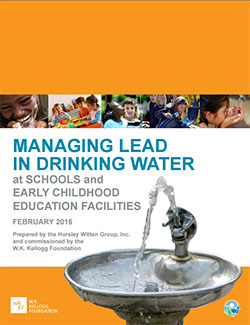Lead is recognized as the single most significant environmental health threat to America’s children, and the W.K. Kellogg Foundation’s just released a report providing tools and resources to schools and early childhood education facilities.
 “Despite progress nationally in reducing children’s exposure to lead, there’s a crisis in our own backyard of Flint, Michigan, where lead-contaminated water is causing a public health emergency,” says La June Montgomery Tabron, president and CEO of the W.K. Kellogg Foundation. “We are deeply disturbed by this critical situation, particularly how it’s impacting children and families of color.”
“Despite progress nationally in reducing children’s exposure to lead, there’s a crisis in our own backyard of Flint, Michigan, where lead-contaminated water is causing a public health emergency,” says La June Montgomery Tabron, president and CEO of the W.K. Kellogg Foundation. “We are deeply disturbed by this critical situation, particularly how it’s impacting children and families of color.”
This crisis makes the W.K. Kellogg Foundation’s commissioned report, Managing Lead in Drinking Water at Schools and Early Childhood Education Facilities, timely and even more important. The report provides steps that schools and early childhood education facilities can take to test water supplies and offers suggestions for remediation.
Lead is recognized as the single most significant environmental health threat to America’s children. Its toxicity in relatively small doses is associated with learning disabilities, poor attention spans and lowered IQ scores. Furthermore, children of color and children living in low-income communities bear a disproportionately high burden of lead exposures and lead toxicity.
“It’s in everyone’s best interests to safeguard our drinking water and ensure our children can grow up in healthy environments where safe drinking water is readily available to support kids’ health, learning and well-being. We hope our report is a step in this direction,” says Tabron.
The report was prepared by the Horsely Witten Group, Inc. and commissioned by the W.K. Kellogg Foundation. Read the report.
